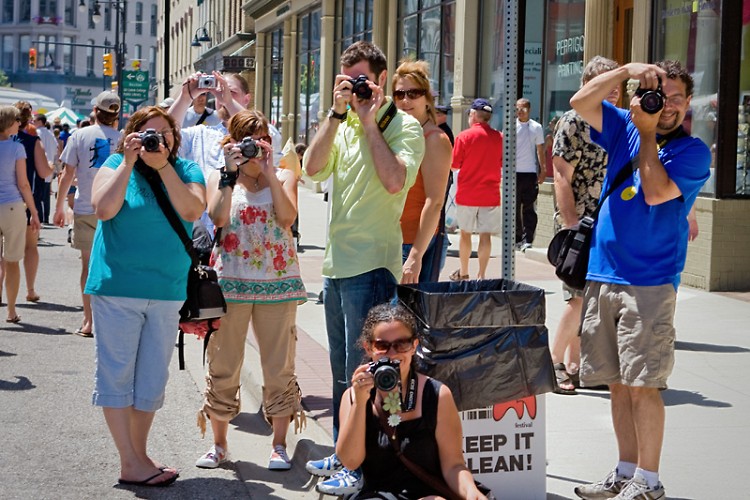One year ago, Catalyst Radio was relaunched with a new team of hosts and fresh eyes on its goal to catalyze change in the community through conversation on social issues, public affairs and media literacy.
As one of the hosts of Catalyst Radio, which is a 30-minute, weekly interview-based program on WYCE 88.1fm, I have been able to hear endless of stories from Grand Rapidians making a positive difference. Whether it was in our own community or having an impact around the world, people shared their experiences on everything from addressing racial equity to helping Syrian refugees, promoting youth creativity to fighting for justice in Standing Rock.
Over the past year, we have seen firsthand how community media can stand as an alternative to the ad-based, profit-driven mainstream media, as well as be a resource for local narratives around culture and society. Also over the past year, however, we have been witness to a national climate of increasing volatility and polarization. As we now enter into a new year, with it comes the latest challenges in our media landscape.
The challenge at the top of my mind is the increased urgency of media literacy.
Media literacy is defined, by the 1992 Aspen Media Literacy Leadership Institute, as the “ability to access, analyze, evaluate and create media in a variety of forms.” In an updated definition from the Center for Media Literacy, they go on that media literacy should promote understanding of the “essential skills of inquiry and self-expression necessary for citizens of a democracy.”
Media literacy is more than a tool for understanding, then, it is a civic duty. In an era of fake news and distrust of media, a lens of critical media literacy skills might help us better understand and engage with the community issues and world around us.
So what are the challenges that we are facing?
The 2016 presidential election, in the words of Chris Jackson of Ipsos Public Affairs, may mark “the point in modern political history when information and disinformation became a dominant electoral currency.” According to a survey conducted by Ipsos Public Affairs for BuzzFeed News, “fake news headlines fool American adults about 75 percent of the time.” Further, those using Facebook “as a major source of news are more likely to view fake news headlines as accurate than those who rely less on the platform for news.”
While fake news is a newer reality of our media landscape, a trend that has been building for years is the distrust of mass media by the public. According to Gallup, trust in mass media “to report the news fully, accurately and fairly” sunk to an all-time low in 2016, down eight points from previous year alone. Only 32 percent say that they have “a great deal or fair amount of trust in the media.”
In order to combat these challenges, we must not only hold media institutions accountable to uphold these principles of critical media literacy, we must also hold ourselves responsible as consumers. We can each adopt an attentiveness and mindfulness toward what we consume and absorb, noticing themes such as authorship, format, audience, content, and purpose. Questions to consider, therefore, as suggested by the Center for Media Literacy’s pedagogy are:
-
Who created this message?
-
What creative techniques are used to attract my attention?
-
How might different people understand this message differently from me?
-
What lifestyles, values and points of view are represented in; or omitted from, this message?
-
Why is this message being sent?
There is no easy solution to fix or improve the media landscape, but there are steps each of us can take to improve our own awareness and engagement. At Catalyst Radio, we plan to continue to ask these questions of ourselves and our guests, and thus feature stories that challenge dominant narratives and create opportunities for informed, inspiring action.
Our episode this coming Friday, January 13 will explore fake news and its implications, previewing an upcoming panel at the Grand Rapids Public Library on the topic. The episode airing on January 20th, Inauguration Day, will provide an essential historical context to the national moment we find ourselves in.
Moving forward in the year, we will continue to feature perspectives to deepen our own critical lenses, building on last year’s interviews like the basics of media literacy, the importance of civil discourse, and the way people can build democracy into online platforms.
I am a firm believer in the power of stories and media to shape ideas and shift culture. As Charles Blow reminded readers in his recent New York Times op-ed, “When politics seem out of your control, remember that community and culture are very much in your control.”
While the Community Media Center can continue to live into our mission of building community through media, particularly with this lens toward media literacy, all of us – programmers, readers, consumers alike – need to adopt our own critical perspective from which to read, write, listen, and speak. The challenges of 2017 require it of us.
The Rapidian, a program of the 501(c)3 nonprofit Community Media Center, relies on the community’s support to help cover the cost of training reporters and publishing content.
We need your help.
If each of our readers and content creators who values this community platform help support its creation and maintenance, The Rapidian can continue to educate and facilitate a conversation around issues for years to come.
Please support The Rapidian and make a contribution today.


